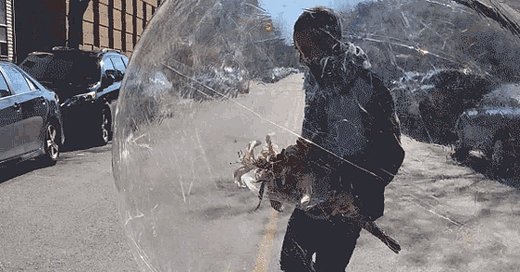WALKTHRU CREW
Imagine the ultimate family business breakup, add some divine intervention, sprinkle in stolen household gods, and top it off with a heated mountaintop confrontation! Genesis 31 gives us front-row seats to Jacob's epic exit strategy from his father-in-law's compound. It's not just a tense family drama – it's a masterclass in divine timing, protection during transitions, and the messy process of breaking with old idols while embracing the one true God who guides our journeys.
The Dance of Divine Redirection
Genesis 31 moves with the momentum of awakening recognition. "Jacob noticed that Laban's attitude toward him was not what it had been." This simple yet loaded observation becomes the catalyst for everything that follows. The pattern is revealing:
Divine directive → Secret preparation → Midnight escape → Pursuit → Confrontation → Covenant
This isn't just narrative progression – it's revealing something profound about how God works. He orchestrates exits from toxic situations, protects during vulnerable transitions, and establishes boundaries where relationships have become exploitative. Each verse builds upon the previous one, creating an intricate picture of divine guidance amidst human complexity.
Breaking Down the Chapter
Verses 1-16: God's call to return and family council
Verses 17-21: The great escape and Rachel's theft
Verses 22-30: Laban's pursuit and God's warning
Verses 31-42: The confrontation and Jacob's defense
Verses 43-55: The covenant of Mizpah
But here's what's fascinating – notice the structure? The chapter begins with God telling Jacob "Return to the land of your fathers" and ends with a boundary covenant where Laban declares "May the LORD keep watch between you and me when we are away from each other." It moves from divine initiation to divine witness, from exploitation to separation under God's watchful eye.
Mountain Showdowns and Divine Protection
When we reach the confrontation on Mount Gilead, the narrative tension peaks. Laban, with relatives in tow, catches up to Jacob's caravan after a seven-day pursuit. But before this potentially violent encounter, God intervenes: "God came to Laban the Aramean in a dream at night and said to him, 'Be careful not to say anything to Jacob, either good or bad.'" (Genesis 31:24)
This is extraordinary! God doesn't just protect those who are perfectly faithful (remember, Jacob's household is literally carrying stolen idols). Instead, He protects the family through whom His covenant promises will continue, despite their messy imperfections.
The divine warning to Laban creates a boundary of protection around Jacob's family that even the angry father-in-law cannot cross. Sometimes, God's most profound protection comes not by removing difficult confrontations but by placing boundaries around them.
The Hidden Idols Dilemma
One of the most intriguing elements of Genesis 31 is Rachel's theft of her father's household gods. While Jacob is breaking away to follow the true God, Rachel secretly clings to these idols, hiding them under her camel saddle and using her menstrual period as an excuse to avoid standing when Laban searches for them.
But what exactly is an idol? In the context of Genesis 31, an idol is anything we trust for security, identity, or control instead of trusting God. These household gods (called "teraphim") were small figurines believed to provide protection, ensure fertility, and secure inheritance rights. They represented control over one's destiny and a tangible sense of security in an uncertain world.
An idol isn't just a statue or physical object – it's whatever claims the trust and dependence that rightfully belongs to God alone. It's what we turn to when life feels uncertain, what we hide and protect when threatened, and what we believe will secure our future apart from God's provision.
This isn't just a quirky subplot – it's a profound picture of our own spiritual journeys. How often do we claim to follow God while secretly sitting on hidden idols? The very things we think provide security (like Rachel may have viewed these gods as her insurance policy or inheritance rights) can become the dangerous baggage we smuggle into our new seasons.
The irony is palpable: Jacob doesn't even know these gods are traveling with them, Rachel risks everything to keep them, and Laban is desperate to recover them – yet all this drama centers around lifeless objects while the living God is actively directing their paths!
Christ as our Covenant Mediator
Genesis 31 anticipates the gospel in profound ways. Jacob's story of leaving bondage and returning to the promised land mirrors our own journey from slavery to sin into freedom in Christ. The confrontation at Mount Gilead, with God stepping in as the ultimate mediator between Jacob and Laban, foreshadows how Christ stands between us and our accusers.
Just as God warned Laban in a dream, protecting Jacob despite his imperfections, Jesus stands as our advocate before the Father, defending us not because of our perfection but because of His covenant promises. The pillar and heap of stones that established boundaries between Jacob and Laban point forward to the new covenant in Christ's blood that forever settles the debt between God and humanity.
Most powerfully, the Mizpah covenant, where God watches between two parties who don't trust each other, finds its fulfillment in Christ who not only watches over us but dwells within us through His Spirit. Where the Mizpah was a boundary marker saying "stay on your side," Jesus tears down dividing walls, bringing true reconciliation rather than mere separation.
Even Rachel's hidden idols speak to our need for Christ. Her desperate clinging to false security reveals our own tendency to trust in things we can control rather than surrendering fully to God. Only in Christ do we find the security to release our hidden idols, knowing His grace is sufficient even when we're caught sitting on our secret sins.
BIBLE TRIVIA BREAK!
Test your biblical knowledge with this quick question:
In Genesis 31, what items did Rachel steal from her father Laban?
A) Silver and gold coins
B) Household idols (teraphim)
C) Family inheritance documents
D) Ceremonial garments
Answer: B) Household idols (teraphim)
Rachel stole her father's household gods (teraphim), then hid them in her camel's saddle and sat on them when Laban searched for them. This fascinating detail reveals the complex religious dynamics at play as Jacob's family transitions from Laban's household to following the God of Abraham and Isaac.
How did you do? Share your score in the comments!
GOD SPOKE TO THE ENEMY TO PROTECT YOU!!!
WAIT—did you catch what happened in Genesis 31:24?
"Then God came to Laban the Aramean in a dream at night and said to him, 'Be careful not to say anything to Jacob, either good or bad.'"
DO YOU REALIZE WHAT THIS MEANS?!
God didn't just speak to Jacob, the covenant carrier. He didn't just guide His chosen one. GOD LITERALLY SPOKE TO THE ENEMY who was pursuing Jacob with harmful intent!
This isn't a minor detail—it's a REVOLUTIONARY revelation about how far God will go to protect you! The God of the universe will literally step into your enemy's bedroom, interrupt their sleep, and WARN THEM not to touch you!
Think about that! The same God who directs your path is simultaneously working behind the scenes to MUZZLE those who pursue you with ill intent. While you're moving forward in obedience, God is already ahead of you, handling situations you don't even know exist yet!
In all of Scripture, this is one of the most stunning examples of God's comprehensive protection. He doesn't just guide us—He actively RESTRAINS those who would harm us along the way!
And here's the mind-blowing truth: The level of divine intervention Jacob experienced isn't exceptional—it's TYPICAL of how God operates in the lives of His covenant people! While you're focusing on following God's direction in your life, He's simultaneously speaking to situations, circumstances, and even people who could derail your journey.
If God was willing to invade Laban's dreams to protect Jacob's imperfect, idol-carrying family, imagine what divine interventions He has orchestrated in your life that you know NOTHING about! How many enemies has He silenced? How many harmful words has He prevented? How many dangerous situations has He neutralized before you even encountered them?
Your journey isn't just protected by what God says to YOU—it's protected by what God says to EVERYTHING and EVERYONE around you!
Your Turn to Walk Through
As you read Genesis 31 again (and I encourage you to do so), consider:
How does the "Mizpah" concept challenge or affirm your understanding of healthy boundaries?
Where do you see yourself in this story – as Jacob making a necessary exit, as Rachel clinging to hidden "gods," or as Laban reluctantly letting go?
What "household gods" might you be sitting on while claiming to follow God's direction?
Remember, this is a revelation of how God works through messy human situations, a testament to divine protection during vulnerable transitions, and an invitation to trust God's guidance even when the path forward involves difficult separations.
Join the Conversation
I'd love to hear your thoughts on Genesis 31 and how it speaks to your own journey of transitions, boundaries, or letting go of old securities. Share your insights, questions, or personal reflections below - this is a space where we can walk through scripture together. Let's GO!









